E-ticaret platformu seçmenin daha basit olduğu zamanları hatırlayın? Şimdi, 2025'te, seçenekler sonsuz görünüyor. WPBeginner olarak, eklenti satışlarımız için Easy Digital Downloads'a bağlı kaldık çünkü ihtiyaçlarımıza mükemmel şekilde uyuyor.
Ancak diğer işletmelere yardım ederken, farklı çözümlerin farklı amaçlara hizmet ettiğini gördüm. Birçok insanı şaşırtan şey, en popüler platformun her zaman kendi özel durumları için en iyi seçenek olmamasıdır.
Kapsamlı testler sonucunda, işletme ihtiyaçlarını gerçekten karşılayan platformları belirledim. Bu kapsamlı rehberde, hangi e-ticaret çözümlerinin gerçekten popülerlik kazandığını ve nedenini paylaşacağım.
Kararım: 2025'in En İyi 3 E-ticaret Platformu
🥇Birinci sıra
Fiyat: Ücretsiz eklenti, ücretsiz/ücretli eklentilerle
En iyi olduğu alanlar: Fiziksel ve dijital ürün satışı
Yüksek ölçeklenebilir ve özelleştirilebilir, kurulumu ücretsiz
🥈İkinci sıra

Fiyat: Ücretsiz ve ücretli planlar (99,50 $/yıl'dan başlar)
En iyi: Dijital indirmeleri satmak için
Kolay kurulum, sınırsız ürün satma
En İyi E-ticaret Çözümlerini Nasıl Test Ettim ve İnceledim
Bu makalede en iyi e-ticaret çözümlerinden bahsedecek olsam da, belirli bir platformu kaç mağazanın kullandığından daha fazlasını dikkate almak gerektiğini biliyorum.
İşletme ihtiyaçlarınız için kullanım kolaylığı ve uygun fiyat dengesini mükemmel bir şekilde sunan popüler e-ticaret platformlarından bazılarını size tanıtmak istiyorum.
Bu platformları test etme ve inceleme yaklaşımım şöyleydi:
- Paranın karşılığı: Bütçe, özellikle küçük girişimler için işletmelerin büyük bir endişesidir. Her platformun fiyatlandırma yapısını, başlangıç planında hangi özelliklerin yer aldığını, yükseltmelerin neleri açtığını ve birikerek artabilecek ek ücretleri inceledim.
- Kullanım kolaylığı: Birçok çevrimiçi mağaza sahibi, işin teknik yönlerine yeni olabilecek kendi kendini yetiştirmiş girişimcilerdir. Bu nedenle, kaydolmayı, çevrimiçi mağazanızı oluşturmayı, yayınlamayı ve günlük operasyonları yönetmeyi kolaylaştıran platformlara öncelik verdim.
- Gerçek dünya deneyimi: Tartışacağım platformlardan bazıları WPBeginner'da kullandığım platformlardır. Bu, deneyimlerime dayanarak onlara güvenle tavsiye edebileceğim anlamına gelir. Diğerleri için zamanımı ve kaynaklarımı onları test etmek için harcadım.
- Müşteri yorumları: Bir platformun sözünü sadece almakla yetinmem. Gerçek müşterilerin neler deneyimlediğini görmek için kullanıcı yorumlarına derinlemesine bakarım. Ardından, platformun vaatlerini yerine getirdiğinden emin olmak için bu yorumları kendi test sonuçlarımla karşılaştırırım.
- Pazar popülerliği: Yalnızca popülerliğe dayanmasam da, bir miktar ağırlığı vardır. Web sitesi teknolojisi takipçisi olan BuiltWith'ı kullandım. Üzerinde oluşturulan aktif web sitelerinin sayısını analiz ederek her platformun mevcut pazar payı hakkında bir fikir edinmeme yardımcı oldu.
Neden WPBeginner'a Güvenmelisiniz?
WPBeginner'da sadece e-ticaret hakkında yazmıyoruz. Büyüyen trendleri, yeni platformları ve şu anda gerçek çevrimiçi mağazalar için neyin işe yaradığını aktif olarak takip ediyoruz.
Kendi eklentilerimiz Easy Digital Downloads kullanılarak satılır ve MemberPress aracılığıyla ücretsiz eğitim kursları paylaşırız. Bu nedenle bir şeyi tavsiye ettiğimizde, çünkü kendimiz kullandık ve işe yaradığını biliyoruz.
WooCommerce, Shopify ve aradaki birçok eklenti gibi başka platformları da test ettik. İster bir dijital mağaza başlatıyor olun, ister tam bir üyelik sitesi oluşturuyor olun, muhtemelen baktığınız şeyi denemişizdir ve muhtemelen onun için bir rehber de yazmışızdır!
Gerçek deneyime dayanan, sadece teoriye değil, dürüst ve başlangıç seviyesine uygun tavsiyeler vermeyi her zaman hedefleriz. Daha fazla bilgi edinmek için editöryal sürecimizi okuyun.
1. WooCommerce (Genel Olarak En İyi E-ticaret Çözümü)

Yıllar boyunca birçok kendi kendine barındırılan e-ticaret çözümünü denedim, ancak WordPress web sitesi aracılığıyla fiziksel ürün satmak için WooCommerce favorim olmaya devam ediyor.
WooCommerce'in küçük işletmeler için harika bir seçim olmasının birkaç nedeni vardır. Her şeyden önce, kurulumu ve kullanımı tamamen ücretsizdir. Her çevrimiçi mağaza gibi alan adı ve web barındırma hizmetine hala ihtiyacınız olacağını unutmayın.
Kullanışlı bir kurulum sihirbazı sizi süreç boyunca yönlendirir, bu da WooCommerce mağazanızı hızlı bir şekilde başlatmanızı kolaylaştırır.
Testler sonucunda eklentinin süper başlangıç dostu ve ölçeklenebilir olduğunu buldum. Daha fazla ayrıntı için, eksiksiz WooCommerce incelememize bakabilirsiniz.
WooCommerce'i gerçekten öne çıkaran şey, abonelikler, rezervasyonlar, toptan satış fiyatlandırması veya üyelikler gibi şeyler eklemenize yardımcı olmak için sunulan geniş özellik ve eklenti yelpazesidir. Bu, mağazanızın nasıl çalıştığı üzerinde size daha fazla kontrol sağlar.
Ayrıca beden, renk veya stil gibi ürün varyasyonları ekleyebilirsiniz, bu da farklı seçeneklere sahip ürünler satıyorsanız mükemmeldir.
Bunun dışında, eklenti ile kargo kurulumu çok kolaydır. Konuma göre sabit oranlar, ücretsiz kargo veya gerçek zamanlı taşıyıcı oranları sunabilirsiniz.
Ayrıca, müşterinizin konumuna göre vergi ayarlarını otomatik olarak işler, bu da küresel olarak satış yapıyorsanız büyük bir zaman kazandırır.
Ödemeler söz konusu olduğunda, WooCommerce, PayPal, Stripe, Apple Pay, Square ve daha fazlası gibi tüm büyük ağ geçitleriyle entegre olur.

Üstelik, sitenizin tasarımını özelleştirmenize olanak tanıyan birçok güzel WooCommerce uyumlu tema da mevcut.
İşletmeniz büyüdükçe sizinle birlikte ölçeklenen sağlam bir platformdur, bu da ister yeni başlıyor olun ister büyük bir çevrimiçi mağaza işletiyor olun akıllı bir seçim olmasını sağlar. Başlamak için WooCommerce'i basitleştirilmiş kılavuzumuza bakın.
Canlı web sitesi kullanım istatistikleri: 6 milyondan fazla
WooCommerce'in Artıları:
- Kurulumu ve kullanımı ücretsiz
- Çok sayıda WooCommerce eklentisi ile yüksek ölçeklenebilirlik
- Kolay keşif için örnek ürünler ve önceden yüklenmiş temalar
- Mağazanızın performansını izlemek için yerleşik analizler
- Tüm ürün türlerini destekler
- Geniş topluluk ve destek
WooCommerce'in Dezavantajları:
- Eklentilerin çokluğu, tamamen yeni başlayanlar için bunaltıcı olabilir.
Fiyatlandırma: WooCommerce'in kendisi ücretsiz bir eklentidir. Özelliklere bağlı olarak, ücretli temalar ve uzantılar 1 ABD dolarından yüzlerce dolara kadar değişmektedir. WooCommerce barındırma hizmetleri genellikle ayda 4 ABD dolarından başlar.
Aylık 3,99 ABD dolarından başlayan SiteGround ve aylık 9,95 ABD dolarından başlayan Bluehost'u öneriyorum.
WooCommerce'i Neden Öneriyorum: WooCommerce, güçlü ve esnek bir çevrimiçi mağazaya ihtiyaç duyan her işletme için en iyi genel e-ticaret çözümüdür. Başlangıç için uygun fiyatlıdır ve büyüdükçe sonsuz özelleştirme seçenekleri sunar.
2. Easy Digital Downloads (Dijital İndirmeler İçin En İyisi)

Easy Digital Downloads (EDD), e-kitaplar, PDF'ler, yazılımlar, ses dosyaları ve daha fazlası gibi dijital ürünler satmak için en iyi e-ticaret çözümüdür. Hatta şirketlerimizde WordPress eklentilerimizi satmak ve müşteri siparişlerini yönetmek için kullandığımız platform aynıdır.
Easy Digital Downloads incelememizde EDD hakkında daha fazla bilgi edinebilirsiniz.
WooCommerce gibi, EDD de çevrimiçi mağazanızın başlatma sürecini kolaylaştıran kullanımı kolay bir kurulum sihirbazına sahiptir. Kullanıcı dostu bir arayüzde işletme ayrıntılarınızı, ödeme ağ geçitlerinizi, makbuzlarınızı ve ürün listelerinizi hızla yapılandırabilirsiniz.
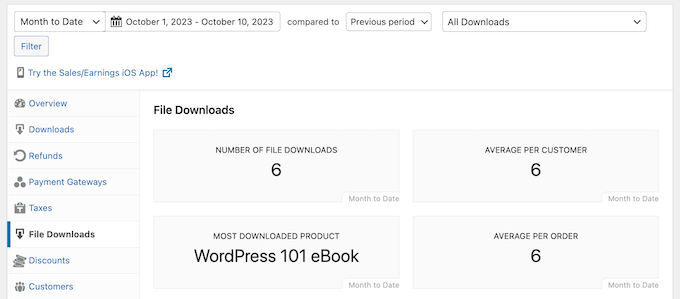
EDD hem ücretsiz hem de ücretli sürümlerde mevcuttur. Birkaç ürünle yeni başlıyorsanız ücretsiz plan harikadır.
Alışveriş sepeti, PayPal ve Stripe gibi popüler ödeme ağ geçitleriyle yerleşik entegrasyon, sipariş geçmişi ve müşteri faturalandırması gibi tüm temel özellikleri içerir.
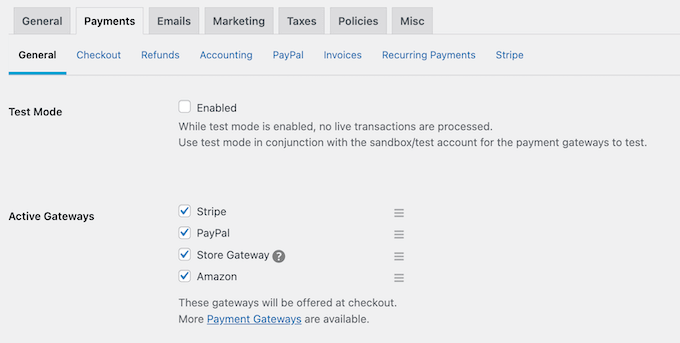
Ancak, ücretsiz sürümde yinelenen ödemeler ve yazılım lisanslama gibi özellikler eksiktir. Bu özellikler, abonelik modelleri veya indirilebilir yazılımlar sunan işletmeler için önemli olabilir.
Adım adım talimatlar için, WordPress'te dijital indirmeleri nasıl satacağınıza dair eğitimimize bakın.
Canlı web sitesi kullanım istatistikleri: 50.000+
Easy Digital Downloads'ın Artıları:
- Kullanıcı dostu arayüz ile kolay kurulum
- Sınırsız ürün satın, işlem ücreti ödemeyin
- Müşterilerin ürünleri denemesi için mevcut ücretsiz deneme özelliği
- Hareket halindeyken mağazanızı yönetmek için mobil uygulama
- Ürün indirmelerini kolayca kısıtlayın
Kolay Dijital İndirmelerin Dezavantajları:
- Yalnızca dijital ürünlerin satışıyla sınırlıdır. Gelecekte fiziksel ürünlere genişlemeyi planlıyorsanız, farklı bir e-ticaret platformunu göz önünde bulundurmanız veya EDD'nin ücretli planlarına yükseltmeniz gerekecektir.
Fiyatlandırma: Ücretsiz sürümü mevcuttur. Ücretli planlar yılda 99,50 ABD dolarından başlar ve yılda 499,50 ABD dolarına kadar çıkar. Başlangıç ücretli planı 1 web sitesinde kullanıma izin verir, e-posta pazarlama araçlarıyla entegre olur ve raporlama özellikleri, özel indirim kodları ve ek ödeme ağ geçitleri desteği sunar.
Aylık 3,99 ABD dolarından başlayan SiteGround'un yönetilen EDD Hosting'ini kullanmanızı öneririm.
Easy Digital Downloads'ı Neden Tavsiye Ediyorum: EDD, dijital ürün satan herkes için harika bir çözümdür çünkü ücretsiz sürümü oldukça cömerttir ve ücretli planları büyüyen işletmeler için güçlü özellikler sunar.
3. MemberPress (Ücretli Üyelikler İçin En İyisi)
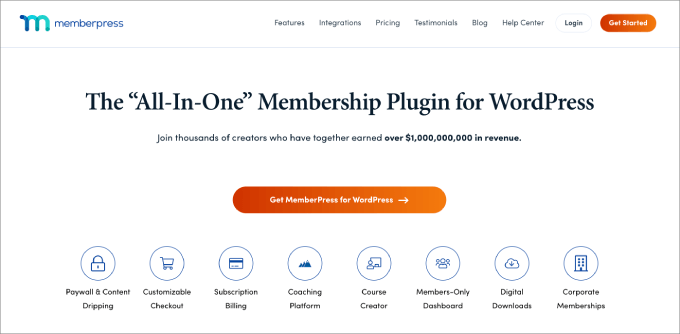
MemberPress, üyelik tabanlı bir iş modeli yürütüyorsanız mükemmel bir e-ticaret çözümüdür. Bu, çevrimiçi kursları, koçluk hizmetlerini veya premium içeriği üyelik ücreti karşılığında sunduğunuz eğitim web sitelerini içerir.
Ücretsiz WPBeginner video üyelik sitesini desteklemek için MemberPress'i kendimiz kullanıyoruz, bu da e-posta listemizi büyütmemize yardımcı oluyor.
Özellikleri hakkında daha fazla bilgi için MemberPress incelememize bakın.

Üyelik sitemiz ücretsiz olsa da, MemberPress, para kazandıran üyelik siteleri oluşturma konusunda oldukça yeteneklidir.
İşletmenizi desteklemek için ücretli içerik, üyelik seviyesi yükseltmeleri, indirim kuponları ve daha fazlası dahil olmak üzere bir dizi özellik sunar.

İçeriğe erişimi kısıtlama söz konusu olduğunda MemberPress benim vazgeçilmez aracım. Web sitenizde kimin neyi görebileceğini kolayca kontrol etmenizi sağlar.
Farklı üyelik seviyeleri oluşturabilir ve ardından hangi sayfaların, gönderilerin veya videoların yalnızca üyelere açık olacağına karar vermek için basit kurallar kullanabilirsiniz. Örneğin, tüm bir kategoriyi kilitleyebilir, dersleri zamanla yayınlayabilir veya belirli indirmeleri yalnızca ödeme yapan kullanıcılara özel hale getirebilirsiniz.
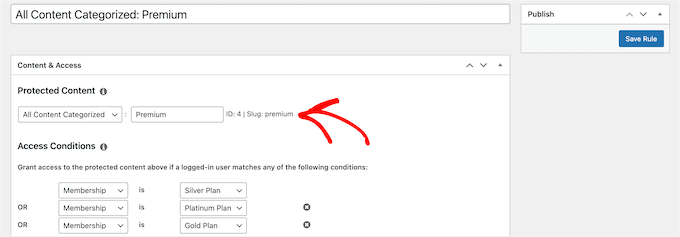
Stripe ve PayPal gibi ödeme seçenekleriyle sorunsuz bir şekilde entegre olur, böylece tek seferlik ücretler veya yinelenen abonelikler alabilirsiniz.
Ayrıca, e-posta pazarlama araçlarıyla gerçekten iyi çalışır ve kullanıcının üyelik düzeyine göre hedeflenmiş e-postalar göndermenize olanak tanır.
Başlamak için, bir WordPress üyelik web sitesi oluşturma hakkındaki nihai rehberimize bakın.
Canlı web sitesi kullanım istatistikleri: 24.575+
MemberPress'in Artıları:
- Sınırsız üyelik, üye, erişim kuralları ve kısıtlı içerik
- Müşterileriniz için kullanımı kolay üye paneli
- Üyelik sitesini ihtiyaçlarınıza göre uyarlamak için kapsamlı eklenti kütüphanesi
- Seçtiğiniz ödeme ağ geçidinin ücretlerine ek olarak işlem ücreti yok
- Çevrimiçi kurs satmak için harika
MemberPress'in Dezavantajları:
- WooCommerce gibi özel platformlara kıyasla daha az yerleşik ödeme ağ geçidi
Fiyatlandırma: Yıllık 179,50 ABD Doları'ndan başlayıp 499,50 ABD Doları'na kadar çıkmaktadır. Temel plan, 1 web sitesinde sınırsız üye ve kurs kullanımı sağlar.
Ayrıca, ilk satın alımınızda %50'ye varan indirimden yararlanmak için MemberPress kupon kodumuzu kullanmaktan çekinmeyin.
MemberPress'i Neden Tavsiye Ediyorum: MemberPress, kurs veya özel içerik satan yaratıcılar ve işletmeler için harika bir seçenektir. Güçlü üyelik özelliklerine sahiptir ve çalışmanızı korumayı kolaylaştırır.
4. WP Simple Pay (Tek Ürün/Hizmet Satışı İçin En İyisi)
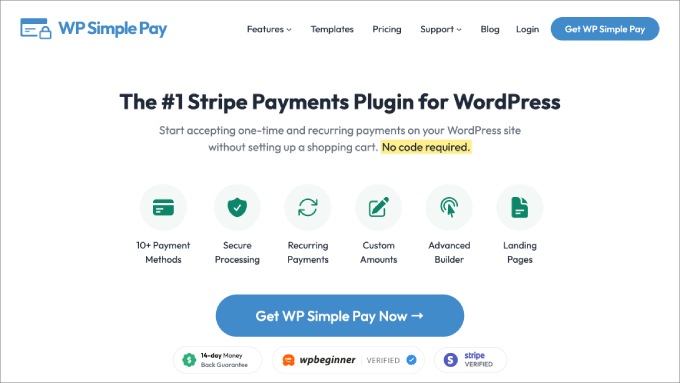
Web siteniz aracılığıyla tek bir ürün veya hizmet satmak istiyorsanız, tüm özellikleriyle tam teşekküllü bir e-ticaret yazılımı fazla gelebilir. Hatta karmaşık bir platform web sitenizi yavaşlatabilir ve müşteri deneyimini bozabilir.
Bu gibi durumlar için, WP Simple Pay gibi bir ödeme işleme eklentisi harika bir alternatiftir. Stripe ile sorunsuz bir şekilde entegre olur ve ayrı bir alışveriş sepetine ihtiyaç duymadan doğrudan WordPress web sitenizde güvenli ödeme formları oluşturmanıza olanak tanır.
Test ettiğimde, süper başlangıç dostu olduğunu gördüm. Ayrıca, tek tıkla ödeme (ani alımlar için mükemmel) ve hatta daha geniş bir kitleyi çekmek için şimdi al sonra öde gibi özellikler sunuyor.
Eklenti hakkında daha fazla bilgiyi WP Simple Pay incelememizde öğrenin.
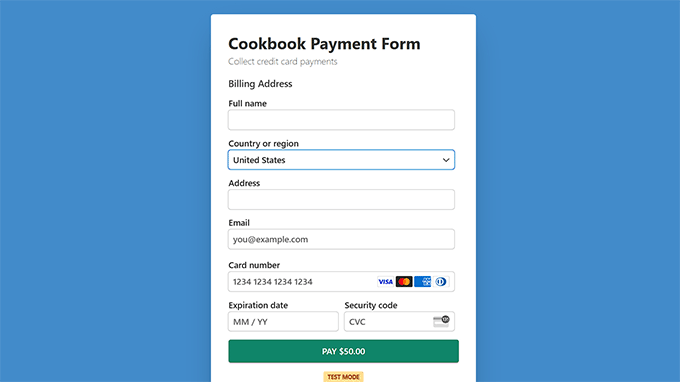
Ancak, WP Simple Pay'in büyük bir ürün kataloğu büyütme planları olan işletmeler için ideal olmadığını hatırlamak önemlidir. Yalnızca bu eklentiye güveniyorsanız sipariş yönetimi yakında yorucu hale gelebilir.
Adım adım talimatlar için, WordPress'te Stripe ödemelerini nasıl kabul edeceğiniz hakkındaki eğitimimize bakmak isteyebilirsiniz.
Canlı web sitesi kullanım istatistikleri: 14.000+
WP Simple Pay'in Avantajları:
- Stripe aracılığıyla, kredi kartları, Apple Pay, Google Pay, QR kodları ve Alipay dahil olmak üzere çeşitli ödeme yöntemlerini kabul eder
- Ödeme işlem ücretlerini müşterilere aktarma seçeneği, karlılığınızı artırır
- Ödeme formlarınız için özelleştirme seçenekleriyle sürükle ve bırak form oluşturucu
- Yerleşik PCI uyumluluğu ile güvenli ödemeler (ek kurulum gerekmez)
- Depozito ödemelerini kabul etmenizi sağlar
WP Simple Pay'in Dezavantajları:
- Geniş ürün envanterine sahip büyük çevrimiçi mağazaları yönetmek için uygun değil
Fiyatlandırma: Ücretsiz plan mevcut. Ücretli planlar yıllık 49,50 ABD Doları'ndan başlayıp yıllık 299,50 ABD Doları'na kadar çıkmaktadır. Tüm planlar, sınırsız ödeme formu, sınırsız işlem ve Stripe'ın işlem ücretlerine ek olarak aylık ücret içermez.
Ayrıca %50 indirim almak için WP Simple Pay kupon kodumuzu kullanabilirsiniz.
Neden WP Simple Pay'i tavsiye ediyorum: Tek bir ürün veya hizmet satan işletmeler için ideal bir seçenektir çünkü tam bir e-ticaret platformunun karmaşıklığı olmadan güvenli bir şekilde ödeme kabul etmenizi sağlar.
💡Alternatif: Ödeme kabul etmek için Square kullanmayı tercih ediyorsanız, MyPayKit harika bir alternatiftir. WP Simple Pay'e benzer şekilde, bu eklenti tam bir e-ticaret sepeti kurmak yerine sitenize Square ödeme formları eklemenize olanak tanır.
Sınırsız form ve işlem sunan ve %3 uygulama ücreti alan ücretsiz bir sürümü mevcuttur. Ücreti kaldırmak ve daha fazla özelliğe erişmek için premium bir plana yükseltebilirsiniz.
5. Shopify (Hepsi Bir Arada Barındırılan E-ticaret Platformu)

Shopify, popüler bulut tabanlı e-ticaret web sitesi oluşturucusudur ve bunun iyi bir nedeni var. Testlerimden yola çıkarak, e-ticaret mağazanızı başlatma ve yönetme sürecini kolaylaştıran kullanıcı dostu, hepsi bir arada bir çözüm olduğuna inanıyorum.
Öncelikle Shopify, ayrı web barındırma ve alan adı sağlayıcıları bulma zahmetini ortadan kaldırır. Dahili barındırma dahil olmak üzere mağazanızı kurup çalıştırmanız için ihtiyacınız olan her şeyi sağlar.
Ayrıca, diğer platformların başlangıç planlarında genellikle eksik olan değerli bir araç olan terk edilmiş sepet kurtarma özelliğini tüm planlarda sunması beni etkiledi.
Hoşlanmadığımız bir şey, Shopify Payments (her ülkede mevcut olmayan) dışındaki üçüncü taraf ödeme sağlayıcıları için tüm planlarda işlem ücretlerinin uygulanmasıdır. Bu ücretler işlem başına %0,2 ila %2 arasında değişir ve daha yüksek katmanlı planlarla daha düşük ücretler ilişkilidir.
Canlı web sitesi kullanım istatistikleri: 5.300.000+
Shopify'ın Artıları:
- Sürükle ve bırak e-ticaret web sitesi oluşturucu, geniş tema koleksiyonu ve kullanımı kolay arka uç ile basit kurulum
- 8.000'den fazla üçüncü taraf uygulaması içeren büyük uygulama mağazası
- 7/24 canlı sohbet müşteri desteği, ihtiyacınız olduğunda yardım alacağınızı garanti eder
- Yerelleştirilmiş satış özellikleri, ürün fiyatlarını pazara göre özelleştirmenize ve vitrininizi farklı dillere çevirmenize olanak tanır
Shopify'ın Dezavantajları:
- İşlem ücretleri, özellikle Shopify Payments kullanmıyorsanız veya üçüncü taraf pazar yerlerinde ürün sergilemek için ücretsiz listeleme sınırını aşıyorsanız, hızla artabilir.
Fiyatlandırma: Temel mağazalar için ayda 19 ABD dolarından kurumsal düzeydeki çözümler için ayda 2.300 ABD dolarına kadar planlar mevcuttur. Basit çevrimiçi mağazalar veya sosyal medya platformlarında satış yapmak için 5 ABD dolarlık bir başlangıç planı da mevcuttur.
Shopify, 3 günlük ücretsiz deneme süresi ve ilk ayınızın geri kalanı için 1$ sunmaktadır.
Shopify'ı Neden Tavsiye Ediyorum: Shopify, hepsi bir arada bir çözüm isteyen yeni başlayanlar için harika bir seçenektir. Kullanımı çok kolaydır ve mağazanızı başlatmak ve büyütmek için ihtiyacınız olan her şeyi içerir.
6. WPForms (Hizmetler/Teklif Tabanlı İşletmeler İçin En İyisi)

WPForms, WordPress için güçlü bir form oluşturucu eklentisidir ve web siteniz için e-ticaret formları oluşturmak için en iyi seçenektir. Çevrimiçi mağazanızın birçok bölümünü yönetmenize, hizmet sorguları toplamanıza ve bu hizmetler için ödeme kabul etmenize olanak tanır.
WPBeginner olarak, iletişim formlarımız ve anket formlarımız da dahil olmak üzere projelerimiz için her türlü formu oluşturmak üzere WPForms kullanıyoruz. Özellikleri hakkında daha fazla bilgi edinmek için, WPForms incelememizi tam olarak görebilirsiniz.
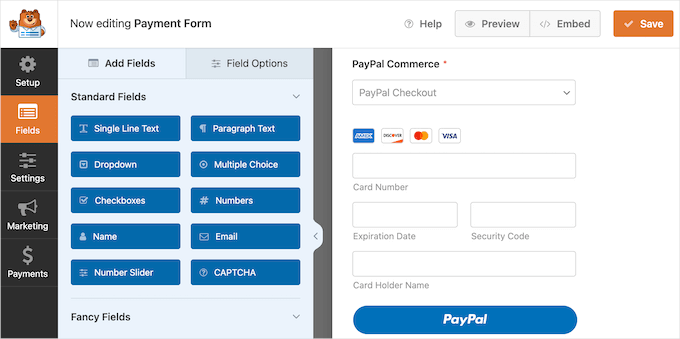
WPForms'u bu kadar kullanıcı dostu yapan şey, 2000'den fazla hazır form şablonundan oluşan kapsamlı kütüphanesidir. Bu şablonlar emlakçılar, tişört tasarımcıları ve otel rezervasyonları dahil olmak üzere çok çeşitli işletmelere hitap etmektedir.
WPForms’ın öne çıkan özelliklerinden biri yerleşik raporlama aracıdır. Bu araç, satış performansınız hakkında değerli bilgiler sağlar ve toplam ödemeleri, satışları, geri ödemeleri ve hatta yeni abonelikleri (varsa) izlemenize olanak tanır.
Ayrıca WPForms, güvenli işlemler için PayPal Commerce, Stripe, Square ve Authorize.net gibi popüler ödeme ağ geçitleriyle entegre olur.
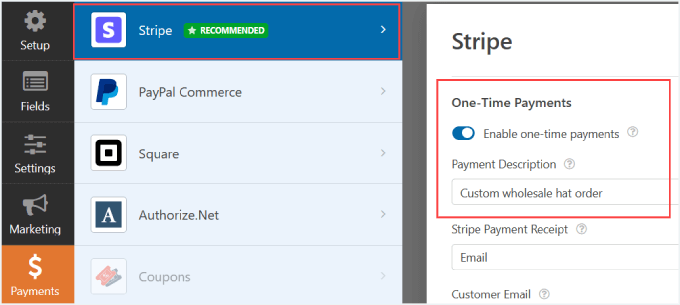
Bunlar en yaygın seçeneklerden bazıları olsa da, WPForms diğer çözümlere kıyasla daha az ödeme entegrasyonu sunar.
Başlamak için, WordPress'te ödeme seçenekleriyle bir form oluşturma hakkındaki eğitimimize bakın.
Canlı web sitesi kullanım istatistikleri: 6.000.000+
WPForms'un Artıları:
- Çeşitli işletme türleri için önceden hazırlanmış form şablonlarından oluşan kapsamlı kütüphane
- Kolay özelleştirme için kullanıcı dostu sürükle ve bırak form oluşturucu
- Satış performansını izlemek için yerleşik ödeme raporlama aracı
- Tam spam koruması
- Web sitenize hesap makineleri ekleyin
WPForms'un Eksileri:
- Bazı diğer çözümlere kıyasla sınırlı ödeme seçenekleri
- Sınırlı e-ticaret özellikleri nedeniyle büyük ürün envanterlerini yönetmek için ideal değil
Fiyatlandırma: Ücretsiz plan mevcut. Planlar, yıllık 49,50 ABD Doları'ndan başlayıp yıllık 299,50 ABD Doları'na kadar çıkmaktadır. En uygun fiyatlı plan, sınırsız form, gönderim ve kullanıcı ile 1 web sitesinde kullanım imkanı sunar.
Ayrıca, %50'ye varan indirimden yararlanmak için WPForms kupon kodumuzu kullanabilirsiniz.
WPForms'u tavsiye etmemin nedeni: Genel olarak, bu form eklentisi hizmet tabanlı işletmeler ve teklif istekleri veya ön ödemeler gerektirenler için harikadır.
7. Squarespace (Yaratıcı İşletmeler İçin)

Squarespace sadece bir web sitesi oluşturucu değil, aynı zamanda yerleşik e-ticaret işlevselliği de sunar. Minimalist web sitesi tasarım şablonlarıyla tanınır ve geniş bir sektör yelpazesine hitap eder.
Deneyimlerime dayanarak, Squarespace'in güzel bir çevrimiçi varlık oluşturmak ve ürünlerini satmak isteyen yaratıcı ve tasarım işletmeleri için mükemmel bir uyum olduğuna inanıyorum.

Bir e-ticaret platformu olarak Squarespace, dijital ve fiziksel ürünler satmanıza olanak tanır. Ayrıca bir e-ticaret sitesi çalıştırmak için çeşitli araçlarla entegre olur.
Örneğin, güvenilir gönderim için FedEx ile ve satış vergi hesaplamalarını otomatikleştirmek için TaxJar ile bağlantı kurabilirsiniz.
Ancak, fiyatlandırma yapısı biraz kafa karıştırıcı. Abonelik ürünleri ve ürün incelemeleri gibi özellikler yalnızca daha üst düzey planlarda mevcuttur; diğer platformlar bu özellikleri standart olarak veya uzantılar aracılığıyla sunabilir.
Canlı web sitesi kullanım istatistikleri: 5.200.000+
Squarespace'in Artıları:
- Göz alıcı, önceden tasarlanmış web sitesi şablonları ve kullanıcı dostu sürükle-bırak web sitesi oluşturucu
- Ödeme işlemcileri, kargo çözümleri ve dropshipping seçenekleri dahil olmak üzere çeşitli çevrimiçi satış araçlarıyla entegre olur
- Çevrimiçi mağazanız aracılığıyla sınırsız ürün satın
- Güvenilir müşteri desteği
- E-posta pazarlaması, SEO, sosyal paylaşım ve gönderi zamanlama için yerleşik araçlar
Squarespace'in Eksileri:
- Temel e-ticaret özellikleri, daha düşük katmanlı planlarda sınırlıdır ve bunlara erişmek için yükseltme gerektirir (bazı rakiplerin aksine)
- Çevrimiçi satış için en uygun planda %3 işlem ücreti uygulanır
Fiyatlandırma: Planlar ayda 16 ABD Doları'ndan başlayıp ayda 52 ABD Doları'na kadar çıkmaktadır. Çevrimiçi satışa izin veren İşletme planı ayda 23 ABD Doları'dır ve içerik üyelikleri, ürünler, hizmetler satma ve ödeme alma gibi özellikler içerir.
Squarespace'i Neden Tavsiye Ediyorum: Platform, yaratıcı işletmeler için harika bir seçimdir çünkü güzel şablonları ve kullanımı kolay web sitesi oluşturucusu, profesyonel görünümlü bir mağazayı hızlı bir şekilde oluşturmanıza olanak tanır.
8. Wix (Belirli İhtiyaçları Olan Niş İşletmeler İçin)
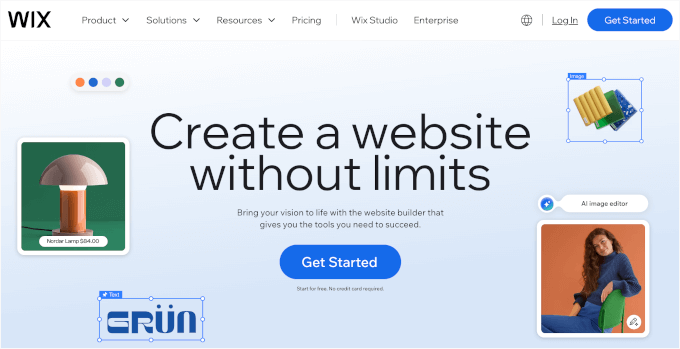
Wix, diğer barındırılan e-ticaret platformlarına benzer yerleşik e-ticaret işlevleri sunan bir web sitesi oluşturucudur. Ancak Wix, benzersiz işletme ihtiyaçlarını karşılayabilecek sektöre özel özellikler sunarak bir adım daha ileri gidiyor.
Örneğin, bir otel yönetiyorsanız, Wix mülkünüzü sergilemek ve çevrimiçi rezervasyonları yönetmek için özel olarak tasarlanmış özellikler sunar.
Bu özellikler, özelleştirilebilir kurallar ve kullanılabilirlik ayarlarıyla kiralama listelerini görüntülemek için araçları içerir.
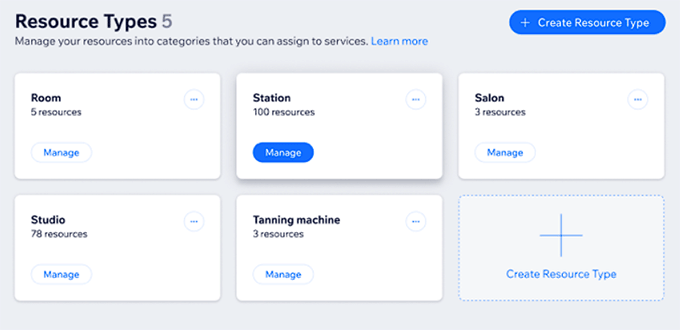
Wix kapsamlı bir özellik setine sahip olsa da, dikkat edilmesi gereken potansiyel bir dezavantajı vardır. Deneyimlerime göre, platformun kendisi biraz yavaş olabilir, bu da kullanıcı deneyimini etkileyebilir. Bazı Wix kullanıcıları ayrıca düşük web sitesi yükleme süreleri bildirmiştir.
Canlı web sitesi kullanım istatistikleri: 8.600.000+
Wix'in Artıları:
- Niş işletmelere yönelik sektör özelinde özellikler (örneğin, tatil kiralama, etkinlik biletleme, dijital sanat)
- 50.000 adede kadar ürün satma yeteneği
- Ön siparişleri ve sosyal medya ve pazar yerleri gibi satış kanallarını destekler
- Geniş bir sektöre özel şablon yelpazesine sahip esnek sürükle ve bırak web sitesi oluşturucu
- Wix ADI ile yapay zeka kullanarak bir e-ticaret mağazası oluşturun
Wix'in Dezavantajları:
- Yavaş olabilir, web sitesi performansını potansiyel olarak etkileyebilir
Fiyatlandırma: Planlar ayda 17 ABD Doları ile ayda 159 ABD Doları arasında değişmektedir. Ücretsiz bir plan da mevcuttur, ancak sınırlı işlevselliğe sahiptir.
Wix'i Neden Tavsiye Ediyorum: Genel olarak, Wix'i temel özelliklerle birlikte gelen, yeni başlayan dostu bir sürükle ve bırak oluşturucuya ihtiyaç duyan web siteleri için tavsiye ediyorum.
9. BigCommerce (Kuruluşlar İçin Premium Çözüm)a

BigCommerce her büyüklükteki işletmeye hitap eder, ancak özellikle yüksek hacimli satışları ve karmaşık ihtiyaçları olan büyük işletmeler için öne çıkar.
Öncelikle BigCommerce, tüm planlarda sınırsız ürün listeleme, dosya depolama, bant genişliği ve personel hesabı sunar. Bu, sınırlamalar konusunda endişelenmeden kapsamlı ürün kataloglarına sahip büyük bir çevrimiçi mağaza oluşturmanıza, yüksek kaliteli ürün resimleri eklemenize ve ekipleri yönetmenize olanak tanır.
Ek olarak, BigCommerce çoklu mağaza cephelerini destekler. Bu, tek bir platform altında ayrı markaları veya bölgesel mağazaları yönetmenizi sağlar.
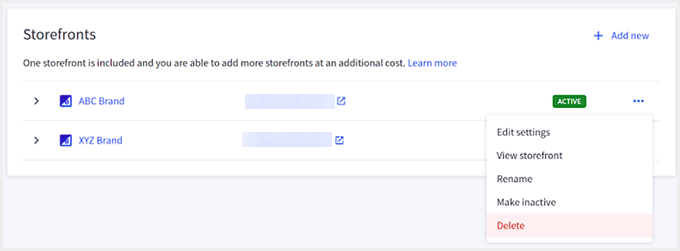
Bununla birlikte, BigCommerce'in her planla ilişkili satış limitleri vardır. Çevrimiçi satışlarınız mevcut planınızın limitini aşarsa, daha üst bir katmana yükseltmeniz gerekir.
Canlı web sitesi kullanım istatistikleri: 42.600+
BigCommerce'in Artıları:
- Tüm planlarda sınırsız ürün, dosya depolama, bant genişliği ve personel hesabı
- Uluslararası satışlar için Çoklu para birimi desteği
- Müşteri kolaylığı için gerçek zamanlı nakliye fiyat teklifleri
- Çok kanallı satış yetenekleri (Amazon, eBay, Walmart, Facebook, Instagram, POS sistemleri)
BigCommerce'in Eksileri:
- Her planda çevrimiçi satış limitleri (aşılması durumunda yükseltme gerekir)
- Sürükle ve bırak e-ticaret web sitesi oluşturucusu kullanımı en kolay değil
Fiyatlandırma: Planlar, ek işlem ücreti olmaksızın ayda 29 ABD dolarından ayda 299 ABD dolarına kadar değişmektedir. En düşük plan yıllık 50.000 ABD doları satış ile sınırlıdır. Ücretsiz 15 günlük deneme sürümü mevcuttur.
BigCommerce'i Neden Tavsiye Ediyorum: BigCommerce, kurumsal düzeyde veya B2B e-ticaret mağazaları için en iyi seçenektir. Yüksek hacimli satışları desteklemek için sınırsız kaynaklara ve güçlü çok kanallı satış özelliklerine sahiptir.
10. Weebly (Freemium E-ticaret Platformu)
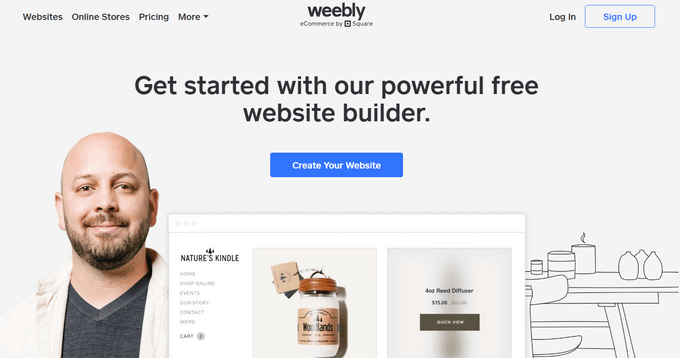
Weebly, yeni başlıyorsanız ve bütçe önemli bir endişeyse, en iyi ücretsiz e-ticaret platformu olarak öne çıkıyor.
Ücretsiz plan, sınırsız ürün satma, envanter yönetme ve hatta satış vergisini otomatik olarak hesaplama gibi şaşırtıcı miktarda işlevsellik sunar.
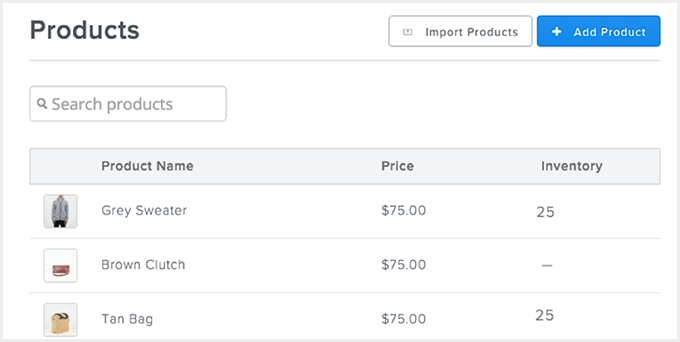
Bulduğum ilginç özelliklerden biri Hızlı Alışveriş işlevidir. Bu, çevrimiçi alışveriş deneyiminizde akıcı bir ödeme süreci oluşturmanıza olanak tanır.
Yalnızca satacak tek bir ürün veya hizmetiniz olduğunda mükemmeldir.
Ancak, Weebly'nin ücretsiz planının sınırlamalarını anlamak önemlidir. Örneğin, çevrimiçi mağazanızı özel bir alan adına bağlayamazsınız, bu da web sitenizin adresinin o kadar profesyonel görünmeyeceği anlamına gelir.
Ayrıca, ücretsiz planda dijital ürün satışı yasaktır.
Canlı web sitesi kullanım istatistikleri: 770.000+
Weebly'nin Avantajları:
- Sınırsız ürün, alışveriş sepeti, stok yönetimi ve temel e-ticaret pazarlama araçları ile cömert ücretsiz plan.
- Güvenli çevrimiçi işlemler için ücretsiz SSL sertifikası.
- Diğer barındırılan e-ticaret platformlarına kıyasla uygun fiyatlı ücretli planlar.
- Mobil uyumlu şablonlar
Weebly'nin Dezavantajları:
- Ücretsiz plan sınırlamaları (özel alan adı yok ve dijital ürün satmakla sınırlı)
- Karmaşık çevrimiçi mağazalar için daha az ölçeklenebilir hissedilebilir
Fiyatlandırma: Ücretsiz plan mevcut. Ücretli planlar ayda 10 ABD dolarından başlayıp ayda 26 ABD dolarına kadar çıkmaktadır. Tüm planlar ücretsiz bir SSL sertifikası, özel kod ekleme yeteneği, Hızlı Alışveriş işlevi ve sınırsız ürün içerir.
Weebly'yi Neden Tavsiye Ediyorum: Kısıtlı bir bütçeyle basit bir mağaza açıyorsanız Weebly kullanmanızı öneririm. Ücretsiz planı çok cömerttir ve başlamanız için ihtiyacınız olan tüm temel özellikleri içerir.
11. Magento (Kurumsal Açık Kaynak Çözümü)
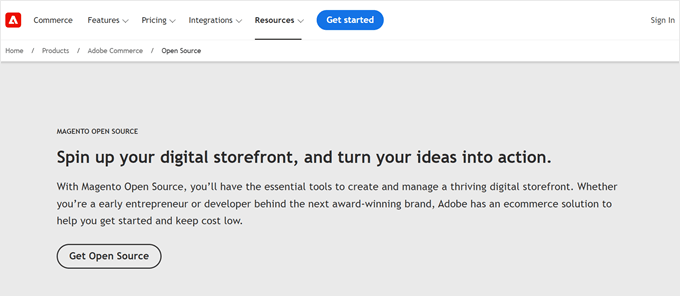
Magento, Adobe Commerce'e ait güçlü bir açık kaynaklı e-ticaret platformudur. Barındırılan çözümlerin aksine, Magento çevrimiçi mağazanızı tam olarak ihtiyaçlarınıza göre uyarlamak için kapsamlı özelleştirme yetenekleri sunar.
WordPress eklentilerine benzer şekilde, Magento uzantıları da müşteri desteği ve güvenlik geliştirmelerinden gelişmiş kargo seçenekleri ve pazarlama araçlarına kadar geniş bir özellik yelpazesi sunar.
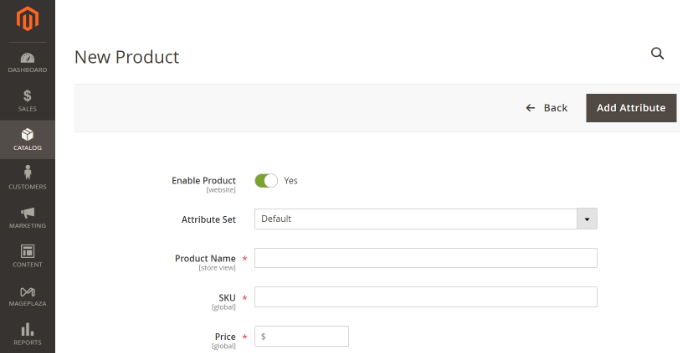
Bu uzantılar mağazanıza önemli bir değer katabilir ancak genellikle ek maliyetlerle birlikte gelir.
Tüm bunları göz önünde bulundurarak, Magento'nun kurulumu ve bakımı önemli ölçüde teknik uzmanlık gerektirir. Ek olarak, genellikle bir VPS (Sanal Özel Sunucu) üzerinde sağlam barındırma kaynakları gerektirir. Yönetilen bir çözüm arayan işletme sahipleri için başka yerlere bakmak daha iyidir.
Canlı web sitesi kullanım istatistikleri: 120.000+
Magento'nun Artıları:
- Açık kaynaklı yazılım, indirmesi ve kullanımı ücretsiz
- Destek için büyük ve aktif bir topluluk forumu
- Mağaza işlevselliğini geliştirmek için kapsamlı eklenti kütüphanesi
Magento'nun Dezavantajları:
- Kurulum, bakım ve güvenlik için önemli teknik uzmanlık gerektirir
Magento'yu Neden Tavsiye Ediyorum: Magento, kendi geliştirme ekibine sahip büyük, köklü işletmeler için iyi bir seçimdir çünkü yönetmek için teknik becerilere sahipseniz güçlü özelleştirme sunar.
Çevrimiçi Mağazanızı Optimize Etmek İçin Kullanılması Gereken Araçlar
En popüler e-ticaret platformlarına aşina olduğunuza göre, mağazanızı optimize etmenize ve dönüşümleri artırmanıza yardımcı olacak mutlaka kullanmanız gereken araçlar şunlardır.
1. FunnelKit
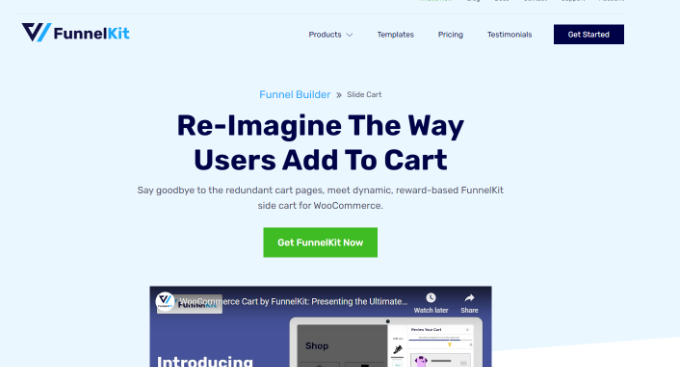
FunnelKit, e-ticaret web sitenizin dönüşüm oranını iyileştirmek için özel olarak tasarlanmış bir satış hunisi oluşturucusudur. Hedeflenmiş satış hunileri oluşturarak, web sitesi ziyaretçilerinizi belirli bir yolculuktan geçirerek satın alma yapmaya yönlendirebilirsiniz.
FunnelKit'i e-ticaret mağazaları için özelliklerini değerlendirmek üzere kapsamlı bir şekilde test ettim. Hakkında daha fazla bilgi edinmek için FunnelKit incelememizi okumaktan çekinmeyin.

Satış hunisi oluşturucusuna ek olarak, FunnelKit Otomasyonlarını da kullanabilirsiniz. Bu araç, ziyaretçilerinizin davranışlarına göre tetiklenen otomatik pazarlama kampanyaları ayarlamanıza olanak tanır. Örneğin, bir satın alma işleminden sonra müşterileri takip etmek veya yeni ürünleri tanıtmak için otomatik olarak e-posta gönderebilirsiniz.
FunnelKit ücretsiz bir sürüm sunsa da, bu sürüm oldukça sınırlıdır. Örneğin, kullanıcıların ortalama sipariş değerini artırmak için ek ürünler sunmak üzere sipariş eklemeleri ayarlamak mümkün değildir. Bu nedenle ücretli bir sürüme yatırım yapmanızı öneririm.
FunnelKit'in Avantajları:
- Temel huniler için hazır tasarım şablonları
- Dinamik teklifler, müşteri alışveriş sepetlerine göre ek satış önerilerini kişiselleştirebilir
- Hunilerinizi daha iyi dönüşümler için optimize etmek üzere bölünmüş test işlevi
FunnelKit'in Dezavantajları:
- Ücretsiz planın sınırlamaları vardır
Fiyatlandırma: Planlar yıllık 99,5 ABD Doları ile yıllık 399 ABD Doları arasında değişmektedir. En uygun fiyatlı plan 1 web sitesinde kullanıma izin verir ve 20'den fazla ödeme sayfası şablonu, 9 ödeme sayfası optimizasyon özelliği ve bir terk edilmiş sepet kurtarma aracı içerir.
FunnelKit'i Neden Tavsiye Ediyorum: Ortalama sipariş değerini artırmak isteyen mağaza sahipleri için harika bir seçenek çünkü satış hunileri ve otomatik kampanyalar oluşturmayı kolaylaştırıyor.
2. OptinMonster
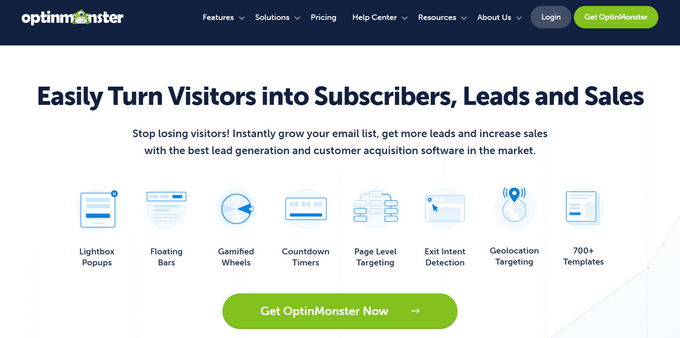
OptinMonster, ziyaretçi e-posta adreslerini yakalamanıza ve e-posta listenizi büyütmenize yardımcı olmak için tasarlanmış güçlü bir potansiyel müşteri oluşturma eklentisidir.
Aboneleri yakalamak için tüm web sitelerimizde kullanıyoruz ve yalnızca WPBeginner'da e-posta abonelerimizi %600 artırmamıza yardımcı oldu. Ayrıntılar için OptinMonster incelememize bakın.
Bu araçla, kullanıcıları abone olmaya ve markanızla etkileşimde kalmaya teşvik etmek için hedeflenmiş açılır pencereler, kayıt formları ve bildirim banner'ları oluşturabilirsiniz.
Bu, potansiyel müşterileri beslemenize, yeni ürünleri ve özel teklifleri tanıtmanıza ve nihayetinde daha fazla satış yapmanıza olanak tanır.
OptinMonster'ın öne çıkan özelliklerinden biri gelişmiş hedefleme yetenekleridir. Örneğin, ziyaretçileri çıkış niyetlerine göre hedefleyebilir (web sitenizden ayrılmaya çalıştıklarında bir açılır pencere göstererek) veya geçmiş satın almalarına göre ürün önerilerini uyarlayabilirsiniz.
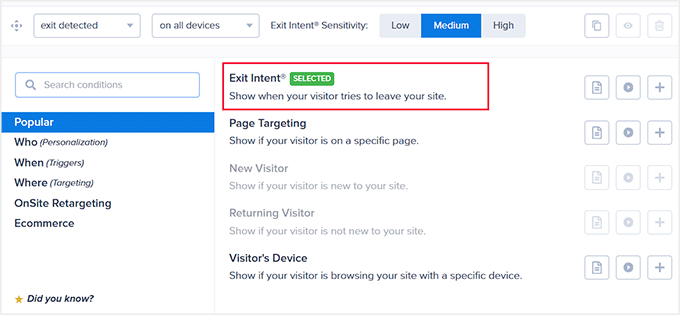
OptinMonster'ın tek dezavantajı ücretsiz planının olmamasıdır, ancak %10 indirim almak için kupon kodumuzu kullanabilirsiniz.
OptinMonster'ın Artıları:
- Çeşitli kampanyalar ve sezonlar için önceden hazırlanmış şablonlardan oluşan geniş kütüphane
- Kolay özelleştirme için kullanıcı dostu sürükle ve bırak oluşturucu
- En etkili pazarlama stratejilerinizi belirlemek için A/B testi işlevi
OptinMonster'ın Dezavantajları:
- Ücretsiz plan mevcut değil
Fiyatlandırma: Planlar ayda 5,97 ABD dolarından ayda 39,97 ABD dolarına kadar değişmektedir. En uygun fiyatlı plan bile sınırsız kampanya ve sınırsız abone sunarak e-posta listenizi büyütmek için uygun maliyetli bir çözüm sunar.
OptinMonster'ı Neden Tavsiye Ediyorum: E-posta listesini büyütmek isteyen her çevrimiçi işletme için ideal seçenektir. OptinMonster, web sitesi ziyaretçilerini daha fazla aboneye dönüştürmenize yardımcı olan güçlü hedefleme özelliklerine sahiptir.
3. Gelişmiş Kuponlar
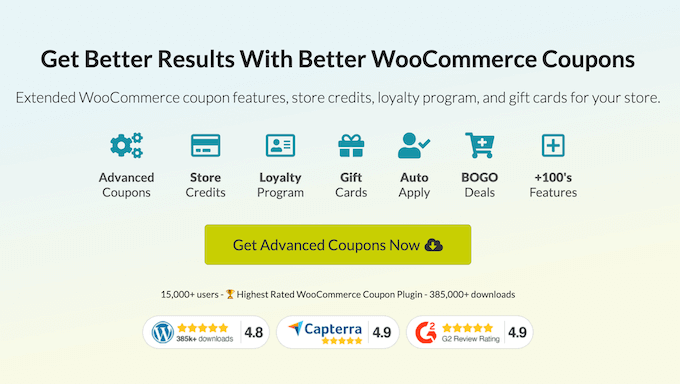
E-ticaret platformunuz olarak WooCommerce kullanıyorsanız, bu zaten yerleşik bir indirim özelliği sunar. Ancak, daha gelişmiş kupon özellikleri arayan işletmeler için, Advanced Coupons dikkate değer güçlü bir eklentidir.
Bu eklenti, ‘Bir Alana Bir Bedava’ (BOGO) teklifleri, benzersiz URL'ler aracılığıyla paylaşılabilecek kupon kodları, belirli zamanlarda etkinleşen veya devre dışı bırakılan zamanlanmış kuponlar ve hatta ödeme sırasında otomatik olarak uygulanan kuponlar dahil olmak üzere çeşitli kupon türleri oluşturmanıza olanak tanır.
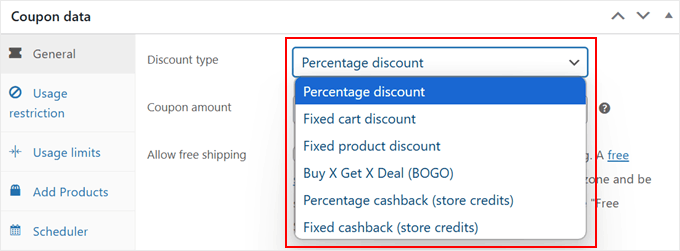
Bununla birlikte, eklenti en iyisidir, eğer çeşitli indirim türleri sunmayı planlıyorsanız. Aksi takdirde, eklenti aşırı gelebilir.
Daha fazla ayrıntı için Gelişmiş Kuponlar incelememizi okuyabilirsiniz.
Gelişmiş Kuponların Artıları:
- Çok çeşitli kupon seçenekleri: tek seferlik indirimler, BOGO fırsatları, yüzde veya sabit tutarlı indirimler, ücretsiz kargo kuponları ve daha fazlası
- Kuponların nasıl uygulanacağını kontrol etmek için kullanım kısıtlamaları ve sepet koşulları belirleyin
- Stratejik promosyonlar ve satış etkinlikleri için kuponları önceden zamanlayın
Gelişmiş Kuponların Dezavantajları:
- Yalnızca temel indirim işlevlerine ihtiyacınız varsa aşırı olabilir
Fiyatlandırma: Advanced Coupons, yıllık 59,50 ABD Doları'ndan yıllık 149,50 ABD Doları'na kadar kademeli planlar sunar.
Ancak, yıllık 249,50 ABD Doları fiyatlı tüm erişim paketini göz önünde bulundurmanızı öneririm. Bu paket, Advanced Coupons, Advanced Coupon'dan Sadakat Programı eklentisi ve Advanced Hediye Kartları eklentisini içerir. Bu, tekrar eden işleri teşvik etmek ve müşteri sadakatini artırmak için eksiksiz bir kittir.
Ayrıca, ilk satın alımınızda %50'ye varan indirimden yararlanmak için kupon kodumuzu kullanabilirsiniz.
Advanced Coupons'u Neden Tavsiye Ediyorum: Sık sık promosyon yapan WooCommerce mağaza sahipleri için Advanced Coupons olmazsa olmazdır. BOGO fırsatları ve zamanlanmış kuponlar gibi güçlü ve esnek seçenekler sunar.
En İyi E-Ticaret Platformu Nedir?
Genel olarak, popülerliği artan en iyi e-ticaret çözümü WooCommerce'dir. Ürünleri, envanteri ve siparişleri yönetmek için kullanıcı dostu bir arayüze sahiptir, bu da onu ilk kez iş kuranlar için mükemmel kılar.
Ayrıca, geniş WordPress eklenti ekosistemiyle entegre olur. Bu, çevrimiçi mağazanız için pazarlama, ödemeler, nakliye ve daha fazlası için sayısız seçenek sunar.
Alternatif olarak, e-kitaplar, yazılım veya kurslar gibi dijital ürünler satma konusunda uzmanlaştıysanız, Easy Digital Downloads mükemmel bir çözümdür. Bu e-ticaret aracı, dijital indirmeleri yönetme, dosyalarınızı koruma ve müşterilerinize güvenli bir şekilde teslim etme sürecini kolaylaştırır.
Özel içerik, kurs veya topluluklar sunuyorsanız, MemberPress, katmanlı erişim seviyeleriyle ücretli üyelikler oluşturmanıza olanak tanır. Bu, premium içerik abonelikleri oluşturma ve yinelenen gelir elde etme esnekliği sağlar.
Online Mağaza Satışlarınızı Artırmak İçin Nihai Rehberler
- Yeni Başlayanlar İçin WordPress E-Ticaret Kurulum Rehberi
- Çevrimiçi Satılacak En İyi Ürünler Nasıl Seçilir (Yeni Başlayanlar İçin Kılavuz)
- Çevrimiçi Satabileceğiniz En Popüler Dijital Ürünler
- WordPress'te Ürün Sayfası Kataloğu Nasıl Oluşturulur (Adım Adım)
- WordPress Sitenizde Dönüşümleri Artırmak İçin FOMO (Kaçırma Korkusu) Nasıl Kullanılır
- WooCommerce SEO Kolaylaştı – Adım Adım Rehber
- WooCommerce Ziyaretçilerini Müşterilere Dönüştürme
- Alışveriş Sepeti Terk İstatistikleri (Uzman Görüşleri)
Umarım bu makale, popülerliği artan en iyi e-ticaret çözümünü bulmanıza yardımcı olmuştur. Ayrıca kanıtlanmış affiliate pazarlama ipuçları hakkındaki makalemizi ve WordPress'te bir yönlendirme programı oluşturma hakkındaki eğitimimizi de incelemek isteyebilirsiniz.
Bu makaleyi beğendiyseniz, lütfen WordPress video eğitimleri için YouTube Kanalımıza abone olun. Bizi ayrıca Twitter ve Facebook'ta da bulabilirsiniz.
Yasal Uyarı: Araştırmamız sırasında PrestaShop ve Big Cartel gibi diğer popüler platformları da değerlendirdim. Ancak, bu kılavuzda ele alınan e-ticaret çözümlerine odaklanmaya karar verdim çünkü daha geniş bir çevrimiçi işletme yelpazesi için en iyi değeri ve kullanıcı deneyimini sunduklarına inanıyoruz.






Olaf
Kaliteli bir çevrimiçi mağaza oluşturmanın çok iş, çaba ve özellikle çok para gerektirdiğini hatırlıyorum. Ayrıca insanlar WordPress'in e-ticaret için iyi olmadığını ve asla olmayacağını söylediğinde de hatırlıyorum. O zamanlar farklı çözümlerimiz vardı. Ama şimdi, yıllar ilerledik, ve WooCommerce tüm bu mitleri paramparça etti. Uygun fiyatlı, esnek ve kullanımı kolaydır. Eklentilerle, ödeme yöntemlerinin büyük çoğunluğunu destekler. Birinci sırada olması şaşırtıcı değil, çünkü çevrimiçi mağazaların büyümesinde büyük ölçüde WooCommerce'e teşekkür edebiliriz. Günümüzde başka çözümlerle nadiren karşılaşıyorum. Hızlı, uygun fiyatlı ve yüksek kaliteli bir e-mağaza mı istiyorsunuz? WooCommerce her şeyi yapar.
Moinuddin Waheed
Bence tüm bu e-ticaret eklentileri değerli ve kullandığımız tamamen uğraştığımız hizmet veya ürün türüne dayanmaktadır.
Örneğin, fiziksel ürünlerle uğraşıyorsak, doğal seçim woocommerce kullanmak olacaktır. çevrimiçi iyi bir ürün tabanlı iş kurmak için tüm seçenekleri sunar.
İşletme dijital ürünler veya hizmetler işletmesi ise, o zaman Easy digital downloads ve memberpress tercih edilen seçeneklerdir.
Şahsen içeriklerime üyelik tabanlı erişim sağlamak için memberpress kullanıyorum.
Bu nedenle, bence tüm eklentiler en iyisidir ve işletmelerine bağlı olarak herhangi birini kullanabilirler.